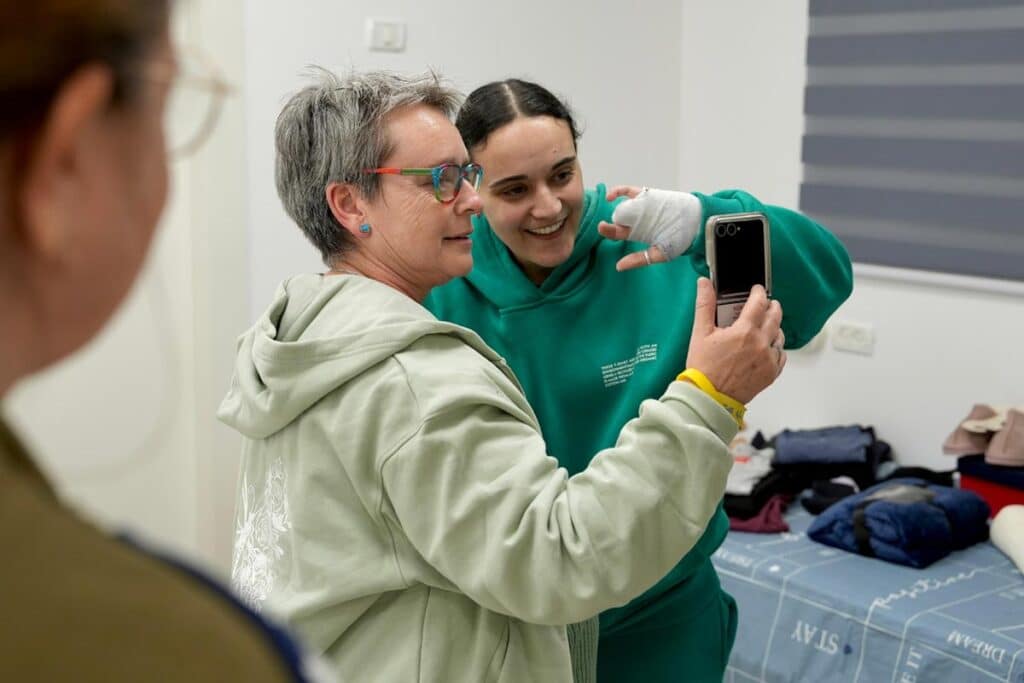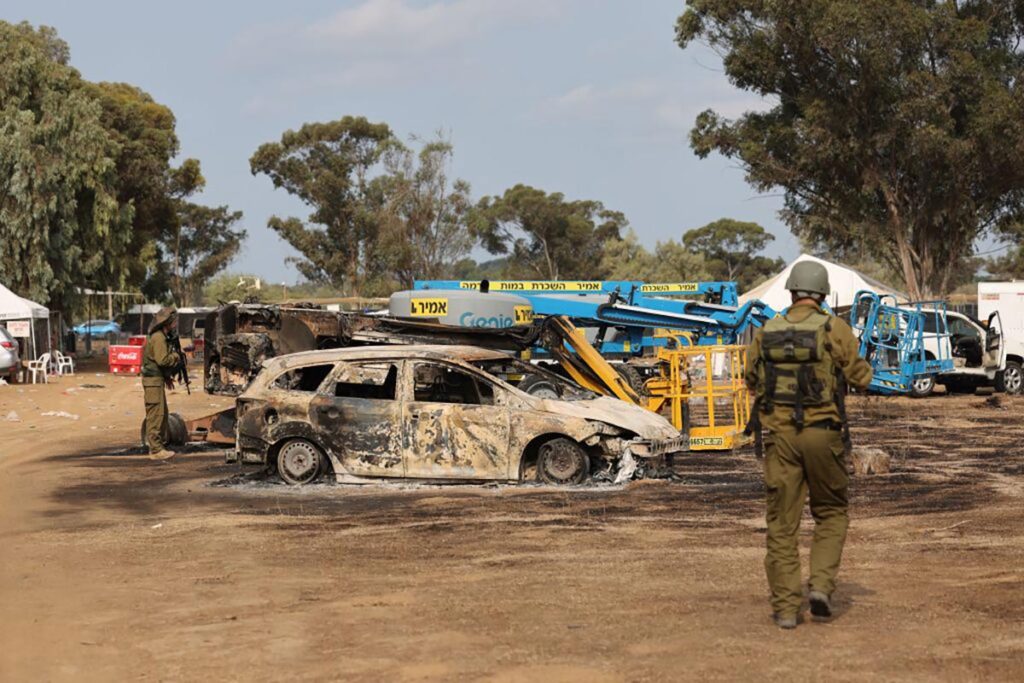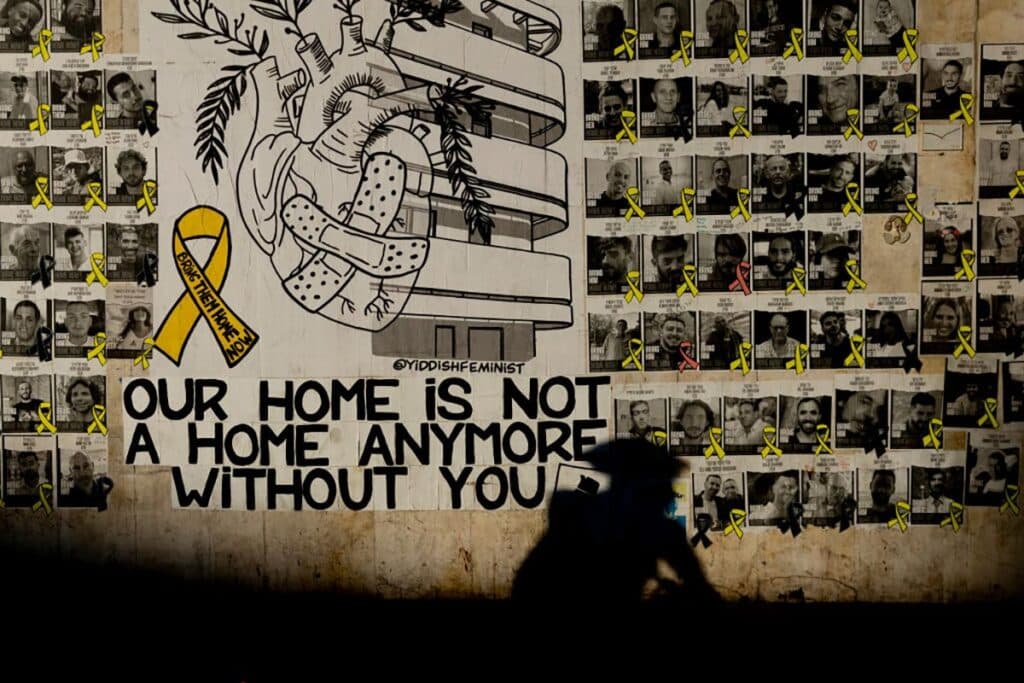![[From left to right:] Emily Damari, Doron Steinbrucher, and Romi Gonen meet with their families after their release from Hamas captivity on January 19, 2025.](https://jewishunpacked.com/wp-content/uploads/Untitled-design-4-1-768x512.png)
Romi Gonen, Emily Damari, and Doron Steinbrecher, who have been held hostage in Gaza for the past 15 and a half months, were released to Israel on Sunday as a ceasefire with Hamas took effect.
The terrorist group delayed the submission of the list of hostages it was going to release on Sunday for several hours. In response to the delay, the IDF announced that it would continue striking Hamas targets until the list was submitted. Shortly after, the list was submitted, and the ceasefire went into effect.
Just like in the first ceasefire in Nov. 2023, Hamas organized a mob around the area where the hostages were handed over to the Red Cross. The mob crowded around the Red Cross vehicles and jeered as the women were handed over.
From there, Gonen, Damari, and Steinbrecher were brought to IDF soldiers in Gaza and then transferred to hospital rehabilitation centers in Israel, where they were finally reunited with their mothers.
Reuniting with family
Footage released on Sunday and Monday showed the first moments they saw their families.
Damari can be seen embracing her mom and shouting triumphantly to her family over video call “I survived!”
Gonen is seen rushing into the arms of her mom, Merav Leshem Gonen, and telling her dad over video call, “Dad! I came back alive!”
The footage also shows the emotional and tearful reunion between Steinbrecher and her mother, Simona, who is heard telling her, “My beautiful girl, you’re with me, I’ll keep you safe.”
The long rehabilitation process
Gonen, Damari, and Steinbrecher were thankfully in relatively decent physical health when they returned on Sunday, although Damari lost two fingers after being shot on Oct. 7.
Steinbrecher’s sister told Army Radio that she “is well, strong, and brave — but the path to rehabilitation will be long.”
The Israeli Health Ministry prepared a detailed protocol for the intake of released hostages ahead of the deal.
Six hospitals have been set up to receive released hostages in units separated from the rest of the hospital. As soon as the hostages arrive at the hospital, they will undergo an initial examination to ensure they don’t need immediate treatment. Then, they are accompanied by at least one family member as much as possible. The healthcare professionals are careful to receive explicit consent from the released hostages for every action to reinforce the fact that they now have control again.
After giving the released hostages a chance to meet with their families, they undergo further tests and, if necessary, treatment. Those evaluations include tests for toxins, deep vein thrombosis, and, if relevant, pregnancy, as there are concerns that the hostages were sexually assaulted during their captivity.
The released hostages also undergo a psychiatric evaluation within at most 24 hours of arriving in Israel.
Healthcare professionals are also extremely careful when it comes to nourishing the released hostages, as they may have suffered from malnourishment and could be at risk of “refeeding syndrome,” which can endanger their health if they eat too much too soon.
“This is a phenomenon we know from the Holocaust, in which a large amount of food is eaten at once, mainly carbohydrates, which can cause a disruption in the body’s salt and fluid balance and, God forbid, lead to medical emergencies,” explained Dr. Hagar Mizrahi, the head of the Health Ministry’s medical directorate to Ynet.
Mizrahi stressed the importance of protecting the privacy of the released hostages. “In past cases when this did not happen, it was very unpleasant. We are approaching very happy moments on the national level, but also complex ones,” Mizrahi said.
The Health Ministry recommends that the returnees remain in the hospital for at least four days, although if they want to leave earlier, that will be respected. For a year after the released hostages’ return, the team that accompanied them in the hospital will continue to monitor them.
Families of the released hostages call for release of remaining hostages
In a press conference by the families of the returned hostages on Monday, Tom Damari, Emily’s brother, stressed that “Although our nightmare has come to an end, there are 94 other kidnapped people and families whose nightmare still continues.”
Yamit Ashkenazi, Steinbrecher’s sister, added, “Doron wants to convey — just because I returned home doesn’t mean that those who are there don’t need to return. Keep fighting.”

Mandy, Emily’s mother, thanked the IDF, the Israeli government, former U.S. president Joe Biden and current president Donald Trump, and the mediators for “making our dream come true.”
She also thanked the British government, Tottenham Hotspur soccer fans, and thousands of volunteers who advocated for Emily: “All of you have played a role in bringing Emily home, thank you from the bottom of our hearts.”
Mandy urged the public to continue fighting to ensure the remaining 94 hostages are released.
“There are too many other families who are waiting to hug their loved ones or bring them back for a public burial,” she said.
Gonen’s mother, Merav, memorialized the individuals who were killed and kidnapped alongside her daughter at the Nova Music Festival.

Romi Gonen was kidnapped by Hamas after she and her friends attempted to flee the Nova Music Festival on Oct. 7 in a car driven by Ben Shimoni, nicknamed the “Angel of Nova.” Shimoni had already escaped the area but returned twice to save nine other people before terrorists murdered him.
Shimoni’s car was found empty. Gonen’s friend Gaya was murdered in the vehicle. Ofir Tzarfati, who was taken captive and whose body was later found by the IDF in Gaza, was also in the vehicle.
“We know from Romi that Gaya was her guardian angel in Gaza,” said Gonen’s mother. “Ofir Tzarfati, who was guarding Romi, got into Ben’s car, and his last words to Romi were “Save yourself.” Ben Shimoni, the heroic driver who rescued and saved 13 people amid the inferno. Courage and brotherhood led to Romi being saved and one day being able to tell everyone’s story.”
“In the last 15 months, our Romi and the rest of the kidnapped women have become family members of the entire people of Israel,” added Merav. “Three kidnapped women who survived captivity in an inspiring way. We did not give up, and we will not give up. We received Romi back for healing, and all families are entitled to this. This is the ultimate goal of the war. I look straight at the Israeli government and say – we are a people who strive for peace and are ready for war when necessary, who unite other peoples thanks to values. There are 94 more of our brothers and sisters to whom we are committed. In order to defeat our enemies, we need each other.”
Oron Shaul brought home after nearly 11 years
The three weren’t the only hostages released over the weekend.
On Saturday, before the ceasefire took effect, the IDF succeeded in retrieving the body of IDF soldier Oron Shaul in a covert operation. Shaul was kidnapped by Hamas during Operation Protective Edge in 2014, and his body had been held in Gaza ever since.
On Monday, Shaul was laid to rest in the Poria Illit cemetery next to his father, Herzl, who passed away in 2016. Thousands accompanied Shaul to his final resting place.
Zehava, Oron’s mother, spoke of the grief she’s suffered through since he was kidnapped.
“I’ve been waiting for you for ten and a half years, and every day it gets worse. I said to myself: ‘Oh, now he won’t come back. They’ll bring back all those who were kidnapped on Oct. 7, but they won’t bring you back, and I’ll have to continue living without you,'” Zehava said. “I waited for him for so many years and I didn’t believe he would come back, I didn’t believe it.”
President Isaac Herzog also eulogized Oron at the funeral, describing him as “a brilliant young man with an artistic soul, who believed with all his heart, as he himself wrote about Gilad Shalit: ‘The state does not abandon, we must not leave any kidnapped person behind.'”
“His people were able to repay him and return his body to eternal rest on his own soil, in a brave and worthy operation by the Shin Bet and the IDF,” Herzog said.
“A whole nation looked with love and immense appreciation to you, beloved Zehava, for your and your family’s steadfast struggle for Oron’s return. I address you on behalf of the State of Israel and ask for your forgiveness — forgiveness for the tortured years that you all went through, years in which we did not live up to the mission and duty of returning him to everyone.”
The body of Lieutenant Hadar Goldin, another soldier kidnapped during Operation Protective Edge, is still being held by Hamas.
IDF Chief of Staff Herzi Halevi stated after the rescue mission, “After more than ten years, we still need to make every effort and explore every lead to bring back Hadar Goldin, and then, along with him, all the hostages and all the fallen, this is our mission.”
90 Palestinian security prisoners released
A few hours after Gonen, Damari, and Steinbrecher were released, 90 Palestinian security prisoners were released from Israeli prisons.
This coming Saturday, another four hostages are set to be released. Hamas is required to submit the list by Friday, although they often intentionally delay the submission as a form of psychological warfare.
What comes next
The next release of hostages will take place on Saturday, when four hostages will be released by Hamas.
After their release, the release of the remaining 26 hostages will take place every seven days, with hostages released three at a time until the last week of the deal, when the last 14 hostages of this phase will be released.

Negotiations will begin on the 16th day of the ceasefire, Feb. 3, concerning the second and third stages of the ceasefire, which would bring about the end of the war and the release of the remaining 61 hostages.
Finance Minister Bezalel Smotrich has insisted that he received a commitment from Prime Minister Benjamin Netanyahu that Israel would prevent the deal from reaching the second and third phases and would restart the war after the first phase. Netanyahu has made vague statements concerning that commitment, instead saying that he committed to achieve the goals of the war, without a specific commitment to do so through a renewal of the war.
Smotrich and members of his party have warned that if the fighting is not renewed, they will leave the government, leaving Netanyahu with a minority in the Knesset and likely pushing the country to early elections.
Three members of the right-wing Otzma Yehudit party — National Security Minister Itamar Ben Gvir; Heritage Minister Amichai Eliyahu; and Negev, Galilee and National Resilience Minister Yitzhak Wasserlauf — announced that they were leaving Netanyahu’s coalition Sunday.
“From this time onwards the Otzma Yehudit party is not a member of the coalition,” the party wrote in a statement.
In the meantime, the IDF and Israeli security forces have been preparing for possible disturbances in the West Bank as Palestinian prisoners are released to the area.
IDF Chief of Staff Herzi Halevi said on Monday, “Alongside enhanced defensive preparations in the Gaza Strip, we must be ready for significant counterterrorism operations in Judea and Samaria in the coming days to preempt and apprehend the terrorists before they reach our civilians.”
